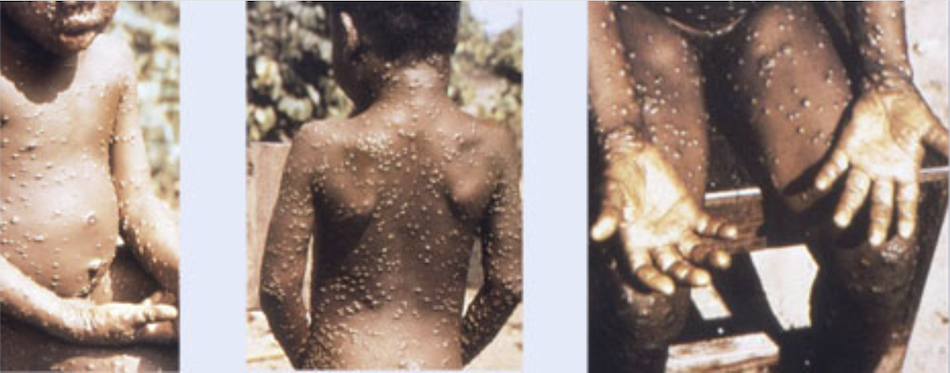
Monkeypox from the CDC website
The CDC released information that the few monkeypox cases that have been suspected or verified in western Europe and the U.S. have mostly affected gay or bi men.
According to the CDC, Monkeypox was first discovered in 1958 when two outbreaks of a pox-like disease occurred in colonies of monkeys kept for research, hence the name ‘monkeypox.’
The first human case of monkeypox was recorded in 1970 in the Democratic Republic of Congo during a period of intensified effort to eliminate smallpox. Since then monkeypox has been reported in humans in other central and western African countries.
The first confirmed case of monkeypox in the U.S. occurred this month in Massachusetts. A second suspected case followed in New York. Several other suspected cases have been found around the country but have not yet been confirmed. All of the cases are related to travel.
Monkeypox is transmitted through close personal contact. Unlike the coronavirus, it is not spread through the air.
Transmission of monkeypox virus occurs when a person comes into contact with the virus from an animal, human or materials contaminated with the virus, according to the CDC website. The virus enters the body through broken skin (even if not visible), respiratory tract, or the mucous membranes (eyes, nose, or mouth).
The symptoms are fever, headache, muscle aches, backache, swollen lymph nodes, chills and exhaustion.
“Within 1 to 3 days (sometimes longer) after the appearance of fever, the patient develops a rash, often beginning on the face then spreading to other parts of the body,” according to the CDC website.
And, the CDC warns, “The illness typically lasts for 2−4 weeks. In Africa, monkeypox has been shown to cause death in as many as 1 in 10 persons who contract the disease.”
There is a vaccine to prevent monkeypox that uses an attenuated (weakened or reduced) live virus. The old smallpox vaccine, which they stopped administering in 1972 when the disease was eradicated, is about 85 percent effective in preventing monkeypox.
— David Taffet












Leave it to gay dudes to Fck monkeys and get it
It’s sad that it has come to a time in this world that we have to experience all kind of viruses and as we go through life we have to protect ourselves from deadly diseases and streets to make matters worse these gay ass men will not protect themselves from any kind of disease the Bible says these times were coming just stay praying
I agree 💯💯
Why y’all always showing blk people,this is a European disease…I comes from Europe stop playing…
FEAR BAIT. Not a single bit of source provided to prove its effecting GAY OR BI MEN. Just statements of people with cases. Not a single mention of any proof or evidence to support the headline. This is RIDICULOUS. Small Pox AND Monkey pox are gained through basic contact with infected or contaminated people/animals or ITEMS LIKE BLANKETS IF YOU KNOW YOUR HISTORY…Sex is obvious there. Gay, straight, you bang an infected you’re gonna get infected. IT IS NOT NARROWED DOWN TO GAY OR BISEXUAL MEN AND THIS IS OUTRAGEOUS FEAR BAIT GARBAGE.
The lies, propaganda, fear and smears that the media spreads each day just keeps getting more ludacris.. Can anyone else not see the agenda they are pushing?? Why are images of African people being shown whenever monkeypox, covid and the like are being covered by these so called media entities?? Belgium instituted quarantine for its majority caucasian population due to monkeypox but the “so called” media (including this one) ONLY SHOWS decades old images of African children that were afflicted with smallpox, why do you think that is??
The CDC has the “same” images of the African child afflicted listed under smallpox and then again under the other section for monkeypox, does anyone else see the many issues with that??
Ever notice how all TV commercials about HIV & AIDS medicine always seem to show African men 80% of the time like clockwork?? Does anyone else think that is normal?? Perhaps the media wants you to think a specific way so they feed you whatever narrative they decide to push as per their corporate bosses. Wise up people, they are trying to program us using “media programs,” they do not represent us.